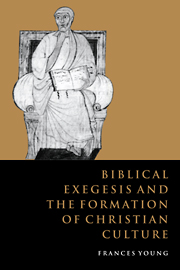Book contents
- Frontmatter
- Contents
- Preface
- List of abbreviations
- Introduction
- PART I EXEGESIS AND THE UNITY OF THE SCRIPTURES
- PART II THE BIBLE AS CLASSIC
- PART III LANGUAGE AND REFERENCE
- PART IV THE BIBLE AND THE LIFE OF FAITH
- Conclusion and retrospect: towards an outline historical account
- Bibliography
- 1 Index ofbiblicaI references
- 2 Index of modern scholars
- 3 Index of subjects
PART IV - THE BIBLE AND THE LIFE OF FAITH
Published online by Cambridge University Press: 02 December 2009
- Frontmatter
- Contents
- Preface
- List of abbreviations
- Introduction
- PART I EXEGESIS AND THE UNITY OF THE SCRIPTURES
- PART II THE BIBLE AS CLASSIC
- PART III LANGUAGE AND REFERENCE
- PART IV THE BIBLE AND THE LIFE OF FAITH
- Conclusion and retrospect: towards an outline historical account
- Bibliography
- 1 Index ofbiblicaI references
- 2 Index of modern scholars
- 3 Index of subjects
Summary
The use to which a work of literature is put surely influences the way it is understood. Technically speaking, exegesis is the self-conscious extension of translation which seeks to spell out meaning, and so might be confined to scholia, or the more elaborate commentary form. But, in practice, texts are interpreted in the context of polemic or debate, in homily or sermon, in liturgy, and by implication through quotation and allusion in all kinds of literary compositions. Does this make a difference? Is exegesis, especially of literature treated by the exegetes and their hearers as authoritative scripture, affected by the context in which the reading takes place, or by the interpretative genre in which it is incorporated or articulated?
The Bible's principal function in the patristic period was the generation of a way of life, grounded in the truth about the way things are, as revealed by God's Word. Exegesis served this end, whatever the context, and so, perhaps surprisingly, different interpretative genres did not produce distinguishable exegetical strategies. The heart of the matter lay in the many-faceted process of finding life's meaning portrayed in the pages of scripture.
- Type
- Chapter
- Information
- Biblical Exegesis and the Formation of Christian Culture , pp. 215 - 216Publisher: Cambridge University PressPrint publication year: 1997

